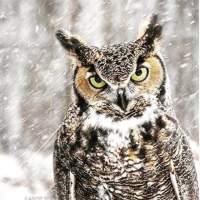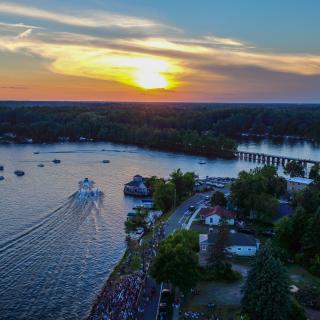A ‘trophy’ fish means different things to different anglers, but nearly all will agree that every musky caught is worthy of some special recognition. You’ve seen the big fish in your friend’s home; you’ve seen the giant muskies hanging high on the wall at the resorts, and you’ve heard the stories of the ferocious battles out on the lake with the red-eyed monsters of the deep.
You want one. You want your own stories. You need one.
The Minocqua fishing area offers some of the best musky possibilities in all of Wisconsin. The Minocqua chain of lakes and nearby bodies of water afford any fishermen the chance for that special photo, that story or a lifetime, and the possibility of ‘one for the wall.’ You’re coming to the right place.
What do we know about muskies?
Muskies tend to grow larger in areas with low predator competition – there’s a fine line between having too many apex predators resulting in smaller fish, and having so few that anglers never catch any. You need that right blend, and Minocqua has that perfect balance that results in one of the best musky fisheries in Wisconsin. Not every area does.
Muskies eat anything they can fit into their mouths. Their elongated bodies and flat heads are designed by nature for quick bursts of speed. Their mouths are filled with teeth that will hold bait fish and other food sources. Hooking into a musky will cause your heart to race, such encounters are unforgettable, and you don’t want to get your fingers in there.
We know that muskies can be a bit lethargic in the early spring; successful musky anglers tend to use smaller lures and a somewhat slower retrieve. In the heat of the summer suspended muskies will hover a bit higher in the weed beds, they’ll take a bigger bait and will bull-rush a lure if need be. At the end of the season bigger muskies will be feeding hard as they fatten up for the winter – use bigger lures and mix up your offerings between spinner baits and jerk baits.
We know that muskies are territorial. If you’re fishing an area of lake and have a follow or a near miss, ease up on the pressure and take some time off from that water and come back in an hour or so. There’s a good chance that musky will still be there later, and there’s a good chance for a hook-up.
We know that muskies are predators and as such lurk in hiding spots as they await the chance to ambush their meals. Great places to fish are along drop offs where weedy shallow waters of six to eight feet angle sharply town to 15 to 20. Topography maps that are sold at bait shops in the area will help you find the lakes you want if you’re pursuing these monsters.
We know that big muskies want big meals. If you’re marking walleyes on your graph there’s a good possibility that a musky is on the fringe of those walleyes. Fish along the outskirts of where you’re marking walleyes, especially near weed beds and inclines.
Ask any angler who has ever been fortunate enough to encounter a musky and they’ll tell you, seeing and catching and holding a 40-plus inch muskellunge is a special experience. When fishing for musky keep an eye on your lure, as it nears the boat it is not uncommon to see big fish trailing along behind – and try to catch your breath when it happens.
The Minocqua area has nearly 3,200 lakes in its region, or 101 square miles of water surface. Among the lakes that veteran musky anglers look to for big fish are Minocqua, Big and Little Arbor Vitae, Squirrel, Clear, Kawaguesaga and Madeline. There are others.
Different lakes in the Minocqua area have different size limits for keeping a musky, each based on management plans for individual lakes. If your plan is to practice catch-and-release you’re probably good with simply going and taking photos. If your idea ahead of time is to catch a musky that might go above the fireplace at home you should catch with area DNR service centers as to regulations.
Different lakes in the Minocqua area also have limits on fishing techniques for fishing for muskies while moving; all lakes allow for casting and retrieve from stationary boats, but Lake Minocqua only allows for row trolling when moving. Check with DNR service centers and bait shops if you have questions.








